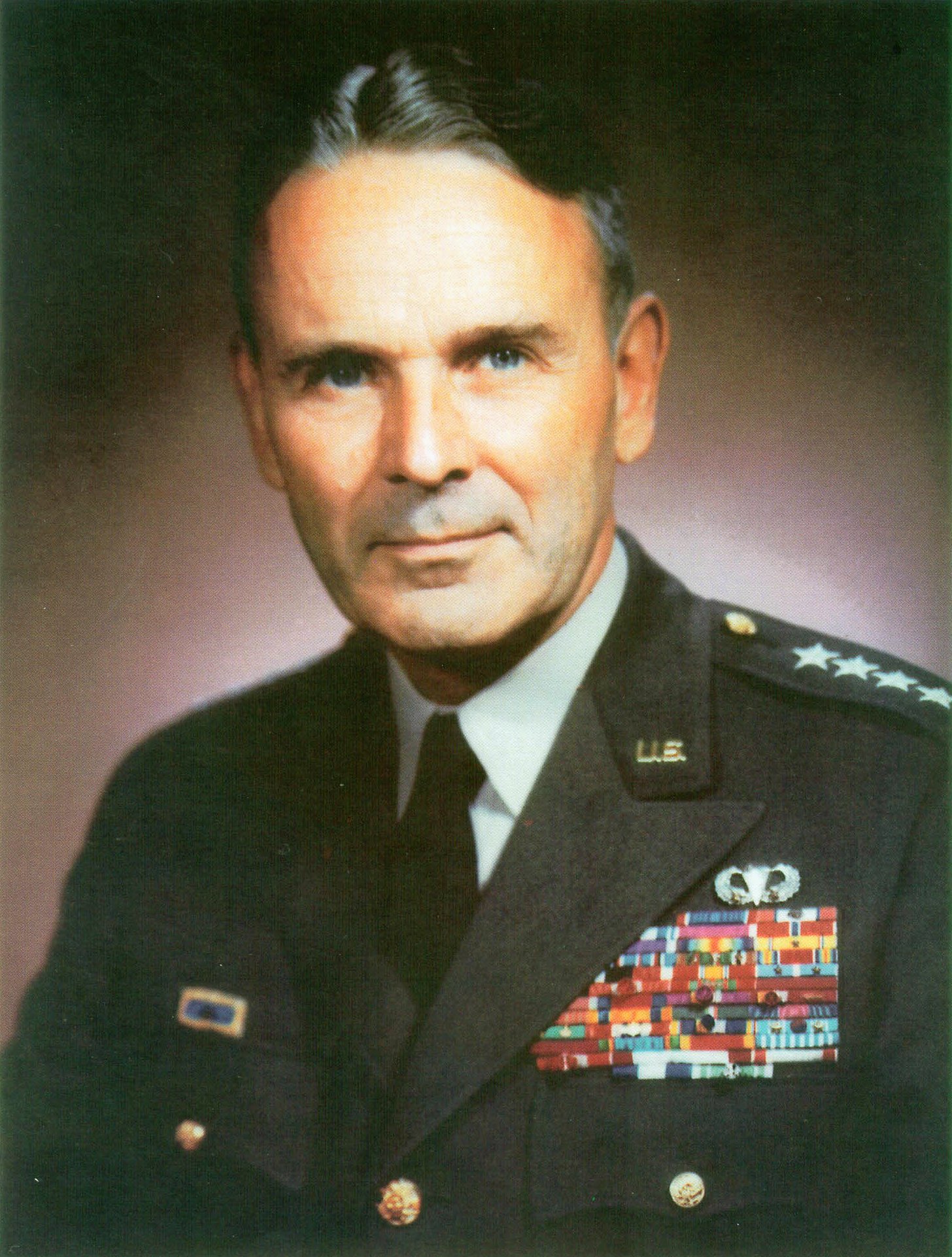Maxwell D. Taylor citáty a výroky
Maxwell D. Taylor: Citáty anglicky
Zdroj: Swords and Plowshares (1972), p. 105
Kontext: A recruit arriving in a new unit feels lonely, homesick, and insecure. Someone has to welcome him when he arrives and make him understand that he is truly wanted. That responsibility is shared by every officer in the channel of command, beginning with the division commander. I made it a point to try to meet every new soldier joining the Division, usually assembling them in small groups for a handshake and an informal talk. A standard question for a new man was why he had volunteered for parachuting and whether he enjoyed it. On one occasion, a bright-eyed recruit startled me by replying to the latter question with a resounding "No, sir." "Why, then, if you don't like jumping did you volunteer to be a parachutist?" I asked. "Sir, I like to be with people who do like to jump," was the reply. I shook his hand vigorously and assured him that there were at least two of us of the same mind in the Division.
Zdroj: Swords and Plowshares (1972), p. 110-111
Kontext: My days in Europe with the 101st were nearly at an end. I suddenly received orders relieving me from the Division and assigning me as Superintendent of West Point. On August 22 I took an emotion-laden leave of my troops in a division review at Auxerre. For all their hard-boiled reputation, generals can be terribly sentimental about their units and their men. Standing bareheaded at the foot of the reviewing stand, I received the last salute of these gallant soldiers, their ribbons and streamers recalling our battles together. They had put stars on my shoulders and medals on my chest. I owed my future to them, and I was grateful.
Zdroj: Swords and Plowshares (1972), p. 105
Kontext: A recruit arriving in a new unit feels lonely, homesick, and insecure. Someone has to welcome him when he arrives and make him understand that he is truly wanted. That responsibility is shared by every officer in the channel of command, beginning with the division commander. I made it a point to try to meet every new soldier joining the Division, usually assembling them in small groups for a handshake and an informal talk. A standard question for a new man was why he had volunteered for parachuting and whether he enjoyed it. On one occasion, a bright-eyed recruit startled me by replying to the latter question with a resounding "No, sir." "Why, then, if you don't like jumping did you volunteer to be a parachutist?" I asked. "Sir, I like to be with people who do like to jump," was the reply. I shook his hand vigorously and assured him that there were at least two of us of the same mind in the Division.
As quoted in The Certain Trumpet: Maxwell Taylor and the American Experience in Vietnam (1991) by Douglas Kinnard, p. 198
Zdroj: Responsibility and Response (1967), p. 49
“It was one thing to decide to go to West Point, another to get there.”
Zdroj: Swords and Plowshares (1972), p. 23
Closing words, p. 421-422
Swords and Plowshares (1972)
Taylor commenting on the fall of Saigon and with it the collapse of the Republic of Vietnam, speaking in a UPI interview in May 1975. Quoted from General Maxwell Taylor: The Sword and the Pen (1989), p. 366
Zdroj: Swords and Plowshares (1972), p. 25
Zdroj: Swords and Plowshares (1972), p. 88
Zdroj: The Uncertain Trumpet (1960), p. 112-113
Zdroj: Responsibility and Response (1967), p. 79
Zdroj: The Uncertain Trumpet (1960), p. 113
Zdroj: Responsibility and Response (1967), p. 18-19
Zdroj: Swords and Plowshares (1972), p. 252
Zdroj: The Uncertain Trumpet (1960), p. 113-114
“Give me three days and three nights of hard fighting, and you will be relieved.”
Statement made by Taylor to the men of Easy Company, 506th Parachute Infantry Regiment, as he circulated among the men on June 4, 1944, two days before commencement of the amphibious invasion of France, Operation Overlord. Easy Company and the entire 101st Airborne Division fought for 7 days, more than twice the promised number, before its last major fight in Normandy at the Battle of Bloody Gulch on June 13. Two days later on June 15, 9 days after the start of Mission Albany, the 101st Airborne's specific part of Overlord, was considered over. As quoted in Band of Brothers (1992) by Stephen E. Ambrose, p. 65
Zdroj: The Uncertain Trumpet (1960), p. 179-180
But this reliance on Massive Retaliation overlooked the fact that atomic bangs could eventually be bought for rubles as well as dollars.
Zdroj: The Uncertain Trumpet (1960), p. 12-13
Zdroj: Swords and Plowshares (1972), p. 88
Zdroj: Swords and Plowshares (1972), p. 25
Zdroj: Swords and Plowshares (1972), p. 28
"Go kill me a German."
Zdroj: Swords and Plowshares (1972), p. 80-81
Zdroj: Swords and Plowshares (1972), p. 94
“For if the trumpet give an uncertain sound, who shall prepare himself to the battle?”
I Corinthians 14:8, displayed on the page following the table of contents.
The Uncertain Trumpet (1960)
Zdroj: Swords and Plowshares (1972), p. 408
Zdroj: Responsibility and Response (1967), p. 29
Zdroj: Responsibility and Response (1967), p. 48
Quote from an interview, "Top Authority Looks at Vietnam War and Its Future", U.S. News & World Report (February 21, 1966), p. 42.
Zdroj: Swords and Plowshares (1972), p. 408
